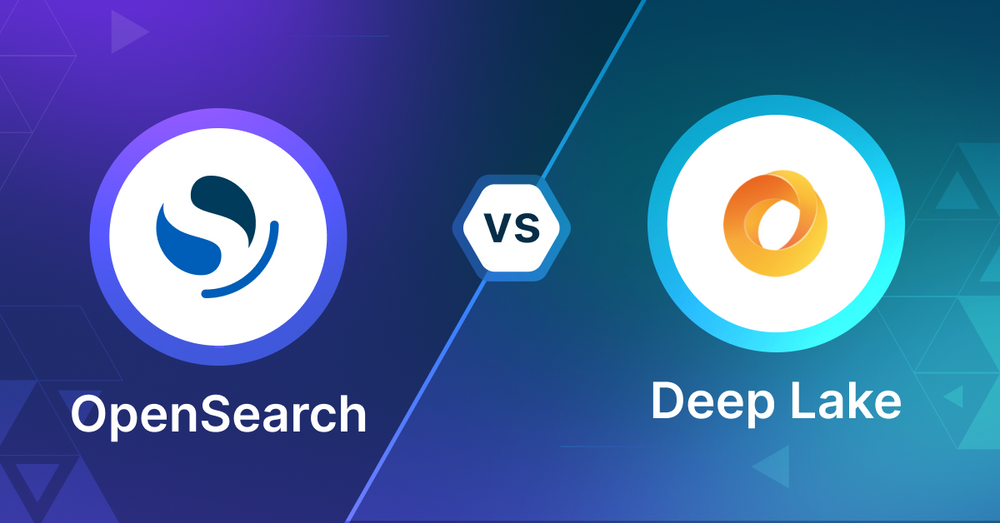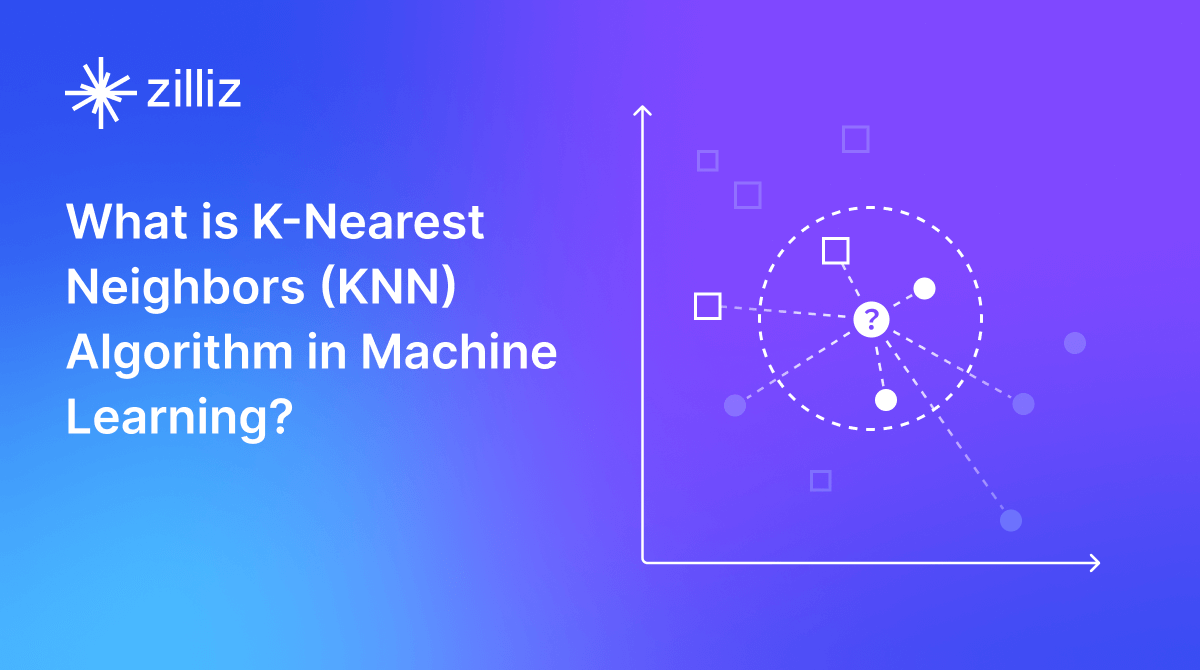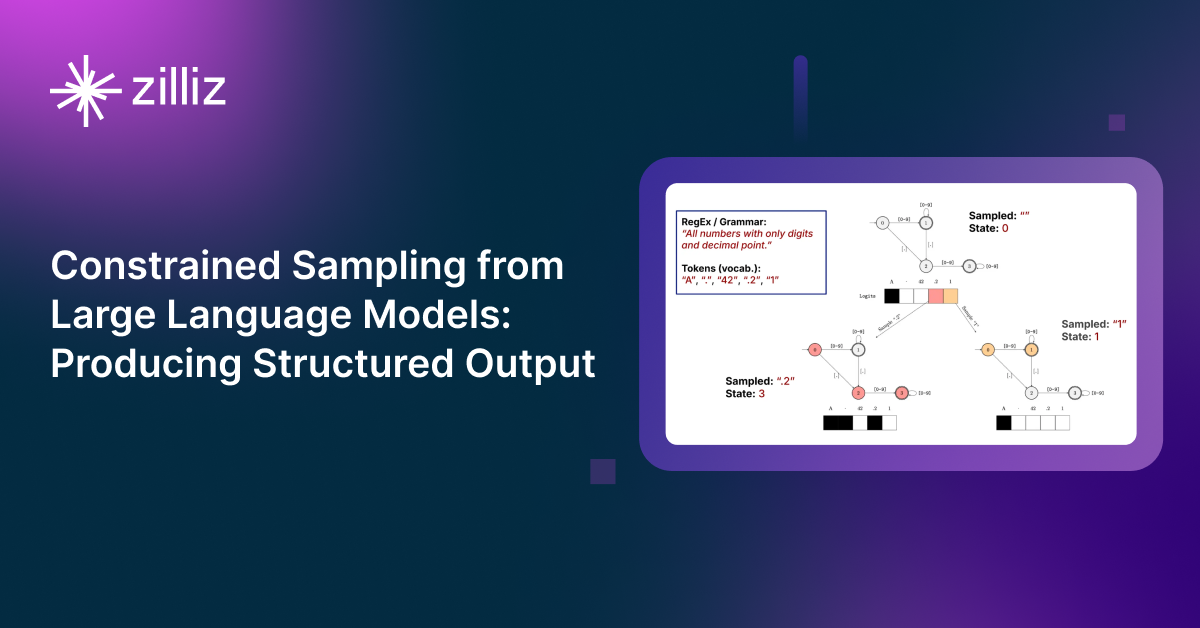OpenSearch vs Deep Lake: Selecting the Right Database for GenAI Applications

As AI-driven applications evolve, the importance of vector search capabilities in supporting these advancements cannot be overstated. This blog post will discuss two prominent databases with vector search capabilities: OpenSearch and Deep Lake. Each provides robust capabilities for handling vector search, an essential feature for applications such as recommendation engines, image retrieval, and semantic search. Our goal is to provide developers and engineers with a clear comparison, aiding in the decision of which database best aligns with their specific requirements.
What is a Vector Database?
Before we compare OpenSearch vs Deep Lake let's first explore the concept of vector databases.
A vector database is specifically designed to store and query high-dimensional vectors, which are numerical representations of unstructured data. These vectors encode complex information, such as the semantic meaning of text, the visual features of images, or product attributes. By enabling efficient similarity searches, vector databases play a pivotal role in AI applications, allowing for more advanced data analysis and retrieval.
Common use cases for vector databases include e-commerce product recommendations, content discovery platforms, anomaly detection in cybersecurity, medical image analysis, and natural language processing (NLP) tasks. They also play a crucial role in Retrieval Augmented Generation (RAG), a technique that enhances the performance of large language models (LLMs) by providing external knowledge to reduce issues like AI hallucinations.
There are many types of vector databases available in the market, including:
- Purpose-built vector databases such as Milvus, Zilliz Cloud (fully managed Milvus)
- Vector search libraries such as Faiss and Annoy.
- Lightweight vector databases such as Chroma and Milvus Lite.
- Traditional databases with vector search add-ons capable of performing small-scale vector searches.
Both OpenSearch vs Deep Lake are traditional databases that have evolved to include vector search capabilities as an add-on.
What is OpenSearch? An Overview
OpenSearch is a robust, open-source search and analytics suite that manages a diverse array of data types, from structured, semi-structured, to unstructured data. Launched in 2021 as a community-driven fork from Elasticsearch and Kibana, this OpenSearch suite includes the OpenSearch data store and search engine, OpenSearch Dashboards for advanced data visualization, and Data Prepper for efficient server-side data collection.
Built on the solid foundation of Apache Lucene, OpenSearch enables highly scalable and efficient full-text searches (keyword search), making it ideal for handling large datasets. With its latest releases, OpenSearch has significantly expanded its search capabilities to include vector search through additional plugins, which is essential for building AI-driven applications. OpenSearch now supports an array of machine learning-powered search methods, including traditional lexical searches, k-nearest neighbors (k-NN), semantic search, multimodal search, neural sparse search, and hybrid search models. These enhancements integrate neural models directly into the search framework, allowing for on-the-fly embedding generation and search at the point of data ingestion. This integration not only streamlines processes but also markedly improves search relevance and efficiency.
Recent updates have further advanced OpenSearch's functionality, introducing features such as disk-optimized vector search, binary quantization, and byte vector encoding in k-NN searches. These additions, along with improvements in machine learning task processing and search query performance, reaffirm OpenSearch as a cutting-edge tool for developers and enterprises aiming to fully leverage their data. Supported by a dynamic and collaborative community, OpenSearch continues to evolve, offering a comprehensive, scalable, and adaptable search and analytics platform that stands out as a top choice for developers needing advanced search capabilities in their applications.
What is Deep Lake? An Overview
Deep Lake is a specialized database system designed to handle the storage, management, and querying of vector and multimedia data, such as images, audio, video, and other unstructured data types, which are increasingly used in AI and machine learning applications. Deep Lake can be used as a data lake and a vector store:
Deep Lake as a Data Lake: Deep Lake enables efficient storage and organization of unstructured data, such as images, audio, videos, text, medical imaging formats like NIfTI, and metadata, in a version-controlled format designed to enhance deep learning performance. It allows users to quickly query and visualize their datasets, facilitating the creation of high-quality training sets.
Deep Lake as a Vector Store: Deep Lake provides a robust solution for storing and searching vector embeddings and their associated metadata, including text, JSON, images, audio, and video files. You can store data locally, in your preferred cloud environment, or on Deep Lake's managed storage. Deep Lake also offers seamless integration with tools like LangChain and LlamaIndex, allowing developers to easily build Retrieval Augmented Generation (RAG) applications.
Comparing OpenSearch and Deep Lake: Key Differences
Search Methodology
OpenSearch builds on Apache Lucene to offer both traditional full-text and advanced vector searches, incorporating machine learning methods like k-NN and semantic search to enhance search relevance across various data types.
Deep Lake specializes in vector and multimedia data, focusing on sophisticated retrieval capabilities tailored to media content such as images, audio, and video, making it ideal for complex media search applications.
Data Handling
OpenSearch manages a diverse array of data types, with recent enhancements like disk-optimized vector search and byte vector encoding to improve efficiency and performance in handling large datasets.
Deep Lake functions as both a data lake and a vector store, efficiently organizing multimedia and vector data, supporting extensive use cases from machine learning model training to complex vector queries.
Scalability and Performance
OpenSearch offers high scalability for large-scale deployments, optimizing search query performance and data ingestion to handle growing data volumes and complex requirements effectively.
Deep Lake provides robust scalability options, allowing data storage locally or in the cloud, optimized for AI and machine learning applications dealing with large volumes of multimedia data.
Flexibility and Customization
OpenSearch features extensive data modeling and query customization capabilities, supported by a dynamic community and a variety of plugins that enhance its adaptability.
Deep Lake offers significant customization in storing and querying data, including seamless integration with tools like LangChain and LlamaIndex for developing specialized AI applications.
Integration and Ecosystem
OpenSearch benefits from a broad ecosystem with strong integrations across data processing, visualization, and collection tools, continually enriched by an active community.
Deep Lake integrates well with AI and machine learning tools, providing specialized support for managing and utilizing multimedia data on a large scale.
Ease of Use
OpenSearch maintains a manageable learning curve despite its complex functionalities, supported by comprehensive documentation and an active community.
Deep Lake targets users dealing with AI and multimedia data, aiming to simplify the management and retrieval of large-scale data with specific tools and interfaces.
Cost Considerations
OpenSearch is cost-effective for open-source deployments but can involve significant operational costs for large, managed deployments.
Deep Lake offers flexible cost management based on deployment strategies, with options for local or cloud-based operations that can vary in cost efficiency.
Security Features
OpenSearch provides comprehensive security features including encryption, access control, and audit logging, suitable for enterprises with strict security requirements.
Deep Lake is expected to include basic security measures to protect sensitive multimedia and vector data, crucial for AI applications.
This format presents a clear, concise comparison that highlights the unique attributes and capabilities of each database, helping you make an informed decision based on your specific application needs.
When to choose the two databases
Choosing between OpenSearch and Deep Lake depends primarily on your specific application needs, particularly in terms of the type of data you're managing and the functionality you require.
Choose OpenSearch when:
- Advanced Text Search is Needed: Your application demands sophisticated text search capabilities, including full-text search, fuzzy searching, and real-time search analytics. OpenSearch is well-suited for environments where search is integrated with complex query requirements across diverse data types.
- Scalable Analytics and Visualization: You require a platform that not only handles search but also provides powerful analytics and visualization tools. OpenSearch is ideal if you need to perform real-time data analysis and visualize those results, leveraging OpenSearch Dashboards for comprehensive data insights.
- Machine Learning Integration: Your projects benefit from the integration of machine learning models directly into the search framework, especially if you're working with AI-driven applications that require on-the-fly embedding generation and sophisticated search models like semantic search.
Choose Deep Lake when:
- Media-Rich Applications: Your application heavily relies on multimedia content such as images, audio, and video. Deep Lake is tailored for efficient storage, management, and retrieval of multimedia data, making it perfect for use cases involving extensive media processing.
- Vector Search Requirements: You need robust support for storing and searching vector embeddings and their associated metadata. Deep Lake excels in handling vector data, providing specialized search functionalities that are crucial for applications like recommendation systems or content discovery platforms.
- Integration with AI Tools: Your development involves Retrieval Augmented Generation (RAG) or similar AI applications that require seamless integration with tools like LangChain and LlamaIndex. Deep Lake is designed to facilitate these integrations, optimizing the creation and deployment of AI-driven solutions.
When to Choose a Specialized Vector Database?
While OpenSearch and Deep Lake offer vector search capabilities, they are not optimized for large-scale, high-performance vector search tasks. If your application relies on fast, accurate similarity searches over millions or billions of high-dimensional vectors, such as in image recognition, e-commerce recommendations, or NLP tasks, specialized vector databases like like Milvus and Zilliz Cloud (the managed Milvus) are a better fit. These databases are built to handle vector data at scale, using advanced Approximate Nearest Neighbor (ANN) algorithms (e.g., HNSW, IVF ) and offering advanced features like hybrid search (including hybrid sparse and dense search, multimodal search, vector search with metadata filtering, and hybrid dense and full-text search), real-time ingestion, and distributed scalability for high-performance in dynamic environments.
On the other hand, general-purpose systems like OpenSearch and Deep Lake are suitable when vector search is not the primary focus, and you’re handling structured or semi-structured data with smaller vector datasets or moderate performance requirements. If you already use these systems and want to avoid the overhead of introducing new infrastructure, vector search plugins can extend their capabilities and provide a cost-effective solution for simpler, lower-scale vector search tasks.
Using Open-source VectorDBBench to Evaluate and Compare Vector Databases on Your Own
VectorDBBench is an open-source benchmarking tool designed for users who require high-performance data storage and retrieval systems, particularly vector databases. This tool allows users to test and compare the performance of different vector database systems such as Milvus and Zilliz Cloud (the managed Milvus) using their own datasets, and determine the most suitable one for their use cases. Using VectorDBBench, users can make informed decisions based on the actual vector database performance rather than relying on marketing claims or anecdotal evidence.
VectorDBBench is written in Python and licensed under the MIT open-source license, meaning anyone can freely use, modify, and distribute it. The tool is actively maintained by a community of developers committed to improving its features and performance.
Download VectorDBBench from its GitHub repository to reproduce our benchmark results or obtain performance results on your own datasets.
Take a quick look at the performance of mainstream vector databases on the VectorDBBench Leaderboard.
Read the following blogs to learn more about vector database evaluation.
Further Resources about VectorDB, GenAI, and ML
- What is a Vector Database?
- What is OpenSearch? An Overview
- What is Deep Lake? An Overview
- Comparing OpenSearch and Deep Lake: Key Differences
- When to choose the two databases
- Using Open-source VectorDBBench to Evaluate and Compare Vector Databases on Your Own
- Further Resources about VectorDB, GenAI, and ML
Content
Start Free, Scale Easily
Try the fully-managed vector database built for your GenAI applications.
Try Zilliz Cloud for FreeKeep Reading

Zilliz Cloud Audit Logs Goes GA: Security, Compliance, and Transparency at Scale
Zilliz Cloud Audit Logs are GA—delivering security, compliance, and transparency at scale with real-time visibility and enterprise-ready audit trails.

What is the K-Nearest Neighbors (KNN) Algorithm in Machine Learning?
KNN is a supervised machine learning technique and algorithm for classification and regression. This post is the ultimate guide to KNN.

Producing Structured Outputs from LLMs with Constrained Sampling
Discuss the role of semantic search in processing unstructured data, how finite state machines enable reliable generation, and practical implementations using modern tools for structured outputs from LLMs.
The Definitive Guide to Choosing a Vector Database
Overwhelmed by all the options? Learn key features to look for & how to evaluate with your own data. Choose with confidence.